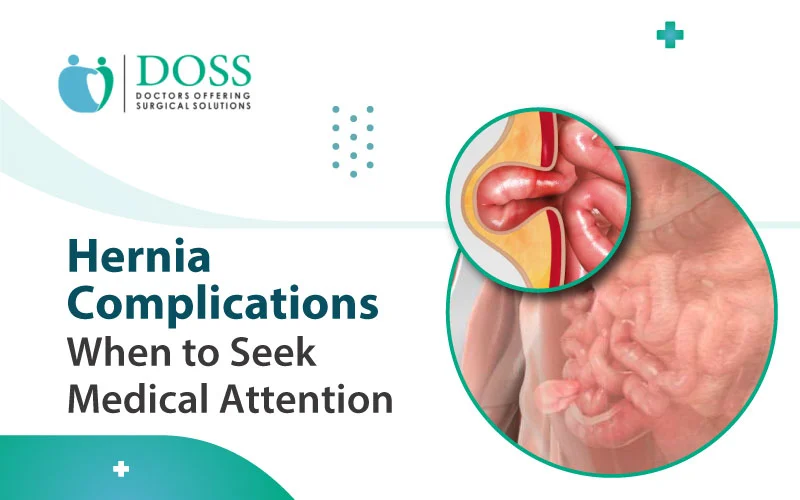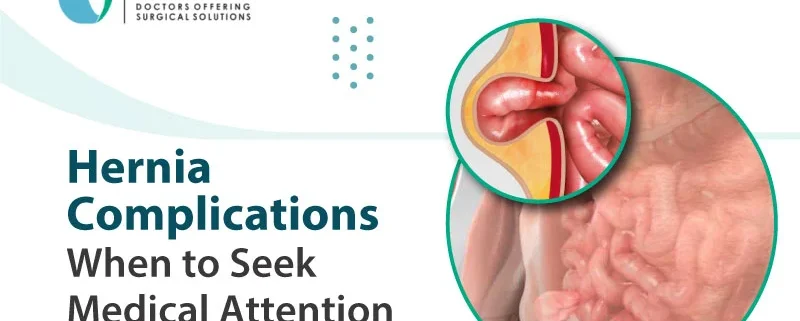Hernia Complications : When to Seek Medical Help
Blog
A hernia is a prevalent health concern in India that affects a significant number of people every year. It’s a condition characterized by an organ or fatty tissue squeezing through a weak spot in a surrounding muscle or connective tissue.
While not always life-threatening, hernias don’t resolve on their own and often necessitate medical intervention to prevent potential complications. This article aims to enlighten readers about hernia complications, how to identify them, and when to seek professional help.
Understanding Hernias
Hernias can occur in various parts of the body, including the abdomen, belly button, upper thigh, and groin areas. They are caused by a combination of muscle weakness and strain. A hernia can develop quickly or over a long period, depending on its cause and the individual’s lifestyle and health condition.
Many factors contribute to the development of hernias, such as lifting heavy objects without stabilizing the abdominal muscles, diarrhea or constipation, persistent coughing or sneezing, and obesity. Age, chronic lung disease, cystic fibrosis, smoking, and a family history of hernias are also contributing factors.
Potential Complications Associated with Hernias
Without treatment, hernias can lead to serious complications:
- Strangulation: This occurs when the herniated tissue’s blood supply is cut off. It’s a severe condition that needs immediate medical attention. Symptoms may include severe pain, nausea, vomiting, and sudden pain that quickly intensifies.
- Obstruction: Here, a part of the intestine gets trapped in the abdominal muscle, resulting in bowel obstruction. Signs include cramping, bloating, constipation, and vomiting.
- Other complications: These include infection, incarceration (a permanently trapped hernia), and tissue damage. In rare cases, a hernia might lead to life-threatening conditions such as gangrene or peritonitis.
Also, Read- Hernia Surgery Cost in Pune
Recognizing Warning Signs
Understanding your body and recognizing changes, especially around the hernia area, is crucial. Increased swelling, sharp pains, skin discoloration, or difficulty passing stool or gas are potential signs of hernia complications.
A noticeable bulge or lump in the affected area is a common hernia symptom. You might see it only when you stand up, and it might disappear when you lie down.
When to Seek Medical Attention
Early intervention can significantly reduce the risk of complications associated with hernias. If you’re experiencing any symptoms of hernia complications, it’s time to consult a hernia specialist in Pune. In India, several medical institutions specialize in hernia treatments.
Self-Assessment for Potential Complications
Awareness of your body and regular self-examinations can help detect hernia complications early.
Look out for any unusual lumps, discomfort, or pain in your body, specifically in the abdominal or groin areas. It’s important to note that hernias are easier to diagnose when you’re standing.
Seeking Professional Medical Evaluation
If you suspect a hernia complication, getting a thorough examination by a qualified surgeon is crucial. Diagnostic tests such as physical exams, X-rays, CT scans, or ultrasound can help confirm the diagnosis and guide the appropriate treatment plan.
Treatment Options for Hernia Complications
Treatment for hernia complications often involves surgery. The type of surgery depends on the size of your hernia and its location. There are two main types of hernia surgeries: open hernia repair (Herniorrhaphy & Hernioplasty) and laparoscopic hernia repair.
Open Vs Laparoscopic Surgery: Which is the Best Procedure
In an open hernia repair, a surgeon makes a large incision in your abdomen. They then push the hernia back into place and sew the area shut. If the hernia is large, the surgeon might use a synthetic mesh to reinforce the area to prevent the hernia from recurring.
In laparoscopic hernia repair, a surgeon makes several small incisions in your abdomen. A tube equipped with a tiny camera (laparoscope) is inserted into one of the incisions. The camera sends images to a monitor that the surgeon uses to guide tiny surgical instruments to repair the hernia.
Lifestyle Changes and Prevention
Adopting healthy habits can reduce the risk of developing hernias. Regular exercise, maintaining a healthy weight, and avoiding heavy lifting can help prevent hernias.
It’s also advisable to eat a high-fiber diet to prevent constipation and straining. Regular check-ups with your surgeon are also essential, especially if you have risk factors for hernias.
The Role Of Diet In Hernia Management
Conclusion
Recognizing the signs of hernia complications and seeking prompt medical attention is critical for your health. Remember, your well-being is in your hands, and taking timely action can make a world of difference. Stay aware, stay healthy, and don’t hesitate to seek professional help when needed.


 +919011100010
+919011100010 


